|
|
|
Sort Order |
|
|
|
Items / Page
|
|
|
|
|
|
|
| Srl | Item |
| 1 |
ID:
154812


|
|
|
|
|
| Summary/Abstract |
Aside from NATO, the Five Eyes intelligence network between the USA, the UK, Canada, Australia and New Zealand is the world’s most enduring multilateral arrangement of its type. While the Five Eyes network does not constitute a formal security alliance in the classic sense of the term, it does emulate significant features of how alliances operate in practice, including active burden-sharing and intra-alliance bargaining. Most analysts claim that the USA dictates in hierarchical fashion the terms and conditions of how the Five Eyes network functions, and that junior partners have little alternative but to fall in line if they want to preserve the flow of high-grade intelligence from Washington. Using Australia as a case study, this article shows that a more fluid relationship has been at play, one that challenges conventional assumptions about asymmetrical alliances and the role of junior partners.
|
|
|
|
|
|
|
|
|
|
|
|
|
|
|
|
| 2 |
ID:
126025


|
|
|
|
|
| Publication |
2013.
|
| Summary/Abstract |
Intelligence is a subject dominated by an Anglospheric lexicon. Little is known of intelligence in the global South, still less of intelligence cooperation. Since 9/11 Western democracies have sought to intensify their intelligence alliances across the world in the Middle East, Latin America, Africa and Asia as part of a US-led 'war on terror'. However, the conceptualisation of intelligence and the nature of secret service cooperation-often referred to as 'liaison'-remains dominated by concepts derived from Western technocratic Cold War surveillance. This article calls for a re-examination of intelligence cooperation based on activity 'beyond the Anglosphere'. It attempts to redefine what intelligence is in the global South and explores the texture of South-South cooperation using Latin American examples. It offers an alternative model of intelligence liaison focused on opportunistic cooperation in the context of drugs and dirty wars.
|
|
|
|
|
|
|
|
|
|
|
|
|
|
|
|
| 3 |
ID:
153166
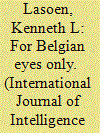

|
|
|
|
|
| Summary/Abstract |
The Kingdom of Belgium has two intelligence services. The domestic State Security service, the Veiligheid van de Staat–Sûreté de l’Etat (VSSE), was established in 1830. A military intelligence service, the Algemene Dienst Inlichtingen en Veiligheid–Service Général du Renseignement et de la Securité (ADIV/SGRS–ACOS-IS1 Within the Belgian Defence flow chart, the service is known as ACOS-IS, Assistant Chief of Staff Intelligence and Security.
), was established in 1915 to provide intelligence for the military and act as a security service for the Belgian Army’s operations.
|
|
|
|
|
|
|
|
|
|
|
|
|
|
|
|
| 4 |
ID:
116613
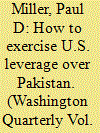

|
|
|
|
|
| Publication |
2012.
|
| Summary/Abstract |
The United States has more leverage over Pakistan than is widely appreciated, and it is time for American policymakers to use it. Since 2001, two successive administrations have tried to persuade Pakistan to end its support for militants-including the Afghan Taliban and the Haqqani network-exclusively through aid, diplomacy, and persuasion with few sanctions or conditions: an approach of all carrots and no sticks. They did so in the belief that Pakistan's fundamental problem was a lack of capacity, not will. They were wrong.
|
|
|
|
|
|
|
|
|
|
|
|
|
|
|
|
| 5 |
ID:
118115
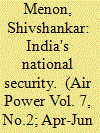

|
|
|
| 6 |
ID:
123946
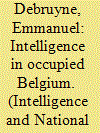

|
|
|
|
|
| Publication |
2013.
|
| Summary/Abstract |
During both World Wars, one of the most powerful weapons Belgian citizens possessed in resisting German occupation of their country was the gathering of intelligence on the enemy for the allied armies. But Belgian's first and second secret wars were different in several respects, one of the most important being the relationship between the Belgian secret services in exile and their British counterparts. If the First World War was essentially a story of bitter concurrency between them, the Second was mostly a tale of 'jealous' partnership. The relations with the intelligence networks in occupied Belgium formed a delicate but crucial issue, where money played an important role. This article explores these dynamics and how they affected the main mission of gathering intelligence on the Germans.
|
|
|
|
|
|
|
|
|
|
|
|
|
|
|
|
| 7 |
ID:
114364


|
|
|
| 8 |
ID:
163084


|
|
|
| 9 |
ID:
092716
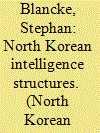

|
|
|
| 10 |
ID:
092925
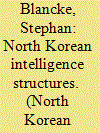

|
|
|
|
|
| Publication |
2009.
|
| Summary/Abstract |
The North Korean intelligence structures still seem to be an enigma to Western intelligence analysts. Only a few incidents are reported in the media; these are mostly connected to criminal activity and are sometimes based on dubious assumptions. A rather disregarded field of North Korean intelligence is what I call "sub-intelligence." This parameter includes information brokerage, business intelligence, "front" companies, hackers, organized crime, ethnic communities, and so on. It is a global network of intelligence-related subjects that are used by the North Korean government and its huge intelligence bureaucracy. They often occupy simultaneous multiple positions in the security and civilian sectors, which complicates their tracing by Western intelligence.
|
|
|
|
|
|
|
|
|
|
|
|
|
|
|
|
| 11 |
ID:
127723


|
|
|
|
|
| Publication |
2014.
|
| Summary/Abstract |
In 2009, a review of the New Zealand intelligence community, the Murdoch Report, recommended increased coordination and reform to the operation of agencies. Since then, the experience of increasing coordination in New Zealand has been more constructive than in other capitals. Reorganizing the intelligence community revolves around relocating multiple agencies within Pipitea House and the creation of a 'one community, many agencies' dynamic. The creation of the Intelligence Coordination Group and an expanded role for the National Assessments Committee plays a vital role in aligning agency priorities. Agencies have also begun to slowdown the assessment process and are introducing new procedures for the analysis and discussion of intelligence products.
|
|
|
|
|
|
|
|
|
|
|
|
|
|
|
|
| 12 |
ID:
079220


|
|
|
|
|
| Publication |
2007.
|
| Summary/Abstract |
The origins of the Anglo-American intelligence relationship are usually dated to the early years of the Second World War. This article suggests that the First World War interaction between the intelligence staffs of the British and American Expeditionary Forces was a significant precursor to the emergence of the later relationship. Using primarily American archival sources, the article reveals an intimacy that emerged in the summer of 1917 and continued, to a lesser extent, until the armistice. The emergence of this close relationship is attributed to a common language, independent-minded intelligence leaders, and an element of chance
|
|
|
|
|
|
|
|
|
|
|
|
|
|
|
|
| 13 |
ID:
137139
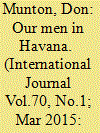

|
|
|
|
|
| Summary/Abstract |
Diplomats based at the Canadian embassy in Havana conducted extensive foreign intelligence operations in Fidel Castro’s Cuba from the early 1960s through the early 1970s. They collected human intelligence of both a political and military nature, using covert as well as overt means. They did so generally at the behest of the United States, and undertook specific “tasked” operations on request from the State Department and the US intelligence community. The diplomat-spies also collaborated operationally with United Kingdom personnel. This article represents the first detailed survey of the Cuba operations and attempts to place Canada’s foreign intelligence program in the context of its relations with the United States and of Canadian foreign policy generally.
|
|
|
|
|
|
|
|
|
|
|
|
|
|
|
|
| 14 |
ID:
107660
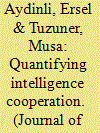

|
|
|
|
|
| Publication |
2011.
|
| Summary/Abstract |
This report describes the creation of the United States International Intelligence Behavior dataset (USIIB). The USIIB represents the first collection of event data specifically intended for exploring in a quantifiable manner the international intelligence cooperation behaviors of the United States. A total of 293,615 events are recorded in the USIIB, covering the years 2000-09. The report first provides a detailed description of the steps involved in building such a dataset, including the development of search terms, the use of a machine coding program (TABARI - Text Analysis by Augmenting Replacement Instructions) to extract data from wire news releases, and the extension of an existing coding scheme (CAMEO) to include intelligence behaviors. Following a discussion of issues related to the reliability and validity of event datasets in general and the USIIB in particular, the report then includes suggestions and examples for how the data in the current USIIB dataset may be used in order to add to our understandings of patterns and anomalies in international intelligence cooperation behavior. As a specific example, it offers results from an empirical test exploring variation in intelligence cooperation behaviors among democracies and non-democracies, asking specifically whether the United States has been more likely in the early 21st century to cooperate on intelligence matters with democratic states, and finding this not to have been the case. Finally, it aims to provide a guide for others who would like to extend this dataset to explore intelligence cooperation activity of other countries or regions.
|
|
|
|
|
|
|
|
|
|
|
|
|
|
|
|
| 15 |
ID:
073525


|
|
|
|
|
| Publication |
2006.
|
| Summary/Abstract |
This article deals with Scandinavian intelligence cooperation and its significance for Swedish security policy during the first part of the Cold War. First, the development of the cooperation is described. Second, it is related to a wider context. Third, intelligence in Swedish security policy-making is discussed. Common security interests caused the cooperation. For Sweden, it represented an important part of the wider contacts with the West. Although military intelligence was important for Swedish security policy-making in some respects (e.g. military readiness), it did not have a significant influence in others (e.g. the politicians' threat perceptions). One important reason is the Swedish tradition of weak connections between the political and military leadership.
|
|
|
|
|
|
|
|
|
|
|
|
|
|
|
|
| 16 |
ID:
116168
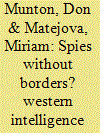

|
|
|
|
|
| Publication |
2012.
|
| Summary/Abstract |
Iran's Islamic Revolution and the takeover of the United States embassy in Tehran in November 1979 was America's and the West's first encounter with contemporary radical Islam. It prompted substantial intelligence cooperation amongst Western countries. Their liaison included not only the collection of human intelligence (Humint) but also an effort to protect six Americans who had escaped becoming hostages, and then a successful covert exfiltration operation to secure their escape from Iran. Canadian embassy staff, assisted by CIA experts, mounted this operation in late January 1980. We use the Iranian Revolution and occupation of the American embassy in Tehran both to flesh out the nature of contemporary Western Humint cooperation and to highlight the intelligence activities, including international intelligence liaison, of Western foreign ministries.
|
|
|
|
|
|
|
|
|
|
|
|
|
|
|
|
| 17 |
ID:
052660
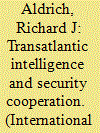

|
|
|
| 18 |
ID:
074314


|
|
|
|
|
| Publication |
Washington, D C, Centre for Transatlantic Relations, 2006.
|
| Description |
xxxvi, 177p.
|
| Standard Number |
0976643448
|
|
|
|
|
|
|
|
|
|
|
|
Copies: C:1/I:0,R:0,Q:0
Circulation
| Accession# | Call# | Current Location | Status | Policy | Location |
| 051822 | 355.03109730242/BRI 051822 | Main | On Shelf | General | |
|
|
|
|
| 19 |
ID:
151103
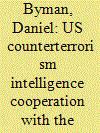

|
|
|
|
|
| Summary/Abstract |
The US struggle against global terrorist groups depends heavily on intelligence cooperation, particularly with developing world countries that are autocratic. This dependence creates many problems. Autocratic allies often have politicized security institutions to prevent a coup and maintain the regime in power. Services will be reluctant to cooperate on areas of high regime sensitivity. Internal communication and information sharing is poor, and security services are often pitted against one another. In addition, the regimes often lack democratic legitimacy, corruption flourishes by design, and many senior leaders are chosen for loyalty, not competence. American influence will be limited, and at times providing fewer resources may gain more influence than providing more assistance.
|
|
|
|
|
|
|
|
|
|
|
|
|
|
|
|
| 20 |
ID:
068782


|
|
|
|
|
|
|
|